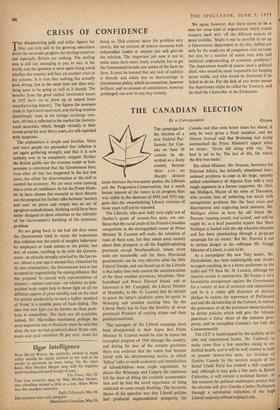CRISIS OF ,CONFIDENCE
HE disappointing gold and dollar figures for I May can only add to the growing uneasiness about the uncertain progress the sterling countries and especially Britain are making. The sterling area is still not managing to pay its way in the world, and the question is once again being asked whether this country will face yet another crisis in the autumn. It is true that nothing has actually gone wrong, but at the same time nor does any- thing seem to be going as well as it should. The benefits from the great capital investment boom in 1955 have yet to show up in output from manufacturing industry. The figures for overseas trade in April were equivocal, and sterling remains disturbingly weak in the foreign exchange mar- kets. All this is reflected in the market for Govern- ment securities, which, though virtually at their lowest point for over thirty years, are still regarded with suspicion.
The explanation is simple and familiar. More and more people are persuaded that inflation is yet again gathering strength, and that it is now unlikely ever to be completely stopped. Neither the British public nor the overseas trader or busi- nessman is convinced that the Government here, even after all that has happened in the last few years, has either the determination or the skill to control the economy. We are once more running into a crisis of confidence. So for the Prime Minis- ter to have chosen this moment to have thrown out the proposal for further talks between 'masters and men' on prices and output was an act of egregious maladroitness. Nothing could have been better designed to draw attention to the infirmity of the Government's handling of the economic problem.
We are going back to the bad old days when the Government tried to create the impression that inflation was the result of naughty behaviour by employers or trade unions or the public, but not, of course, anything to do with the Govern- ment : an attitude strongly attacked by the Specta- tor. About a year ago it seemed that, exhausted by its own exhortations, the Government had at last accepted its responsibility for ending inflation. But this proposal 'to consult with representatives of industry—masters and men—on whether an inde- pendent body might help to throw light on all the different aspects of price stability and on the need for greater productivity to earn a higher standard of living' is a notable piece of back-sliding. The idea that new light can be thrown on these prob- lems is moonshine. The facts are all available; indeed, Mr. Macmillan mentioned perhaps the most important one at Stockton when he said that since the war we had produced about 30 per cent. more and paid ourselves 90 per cent. more for doing so. This contrast states the problem very clearly, but no amount of solemn nonsense with independent bodies or anyone else will provide the solution. The important job now is not to make more facts more freely available but to get the Government to take any notice of the facts we have. It must be insisted that any lack of stability is directly and solely due to shortcomings in Government policy, which no committee, however brilliant, and no amount of consultation, however prolonged, can ever in any way remedy. We agree, however, that there seems to be a case for some kind of organisation which would concern itself with 'all the different aspects of price stability.' Might it not be possible to set up a Government department to do this, staffed not only by the usual run of competent civil servants but also by a number of senior men with real technical understanding of economic problems? The department would of course need a political chief, who would be made responsible for keeping prices stable, and who would be dismissed if he failed to do so. For the lack of any better names the department might be called the Treasury, and its chief the Chancellor of the Exchequer.


































 Previous page
Previous page